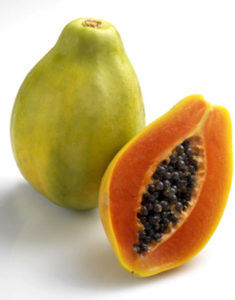When it comes to gut health, there are many recommendations for foods and drinks and a plethora of supplements out in the market that you can find. To make this simpler for you, we’ve chosen to divide our recommendations into three categories that we believe when used in conjunction with a gut-healing diet can really see your health flourish.
The categories are:
- Digestive Boosters
- For Gut Diversity And Healing
- Gut Strength
Digestive Boosters
One of the causes of digestive issues is low stomach acid. Ironically, this can lead to a host of stomach and bowel issues, even ulcers and slow digestion.
Slow digestion is when the transit time between eating and excreting takes too long. When food sits in the intestines, bad bacteria and fungi have ample opportunity to get busy — literally. Yes, bacteria have a banquet, followed by an orgy in your gut, and everyone is invited. They eat and reproduce, resulting in an imbalance of colonies. Certain species damage your gut lining when they take over. Strains like candida albicans, a yeast, drill holes in your intestinal membrane, which allows undigested food particles to cross into your bloodstream. These wayward food particles burden the liver and compound the toxicity problem. Little bastards.
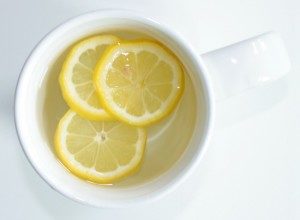 To assist with the digestion of your food, you can try different forms of bitters or foods that help to raise stomach acid. Examples include:
To assist with the digestion of your food, you can try different forms of bitters or foods that help to raise stomach acid. Examples include:
- Lemon Juice – so simple, yet so good. One of the best ways you can start your day is to drink a glass of warm water with the juice of ½ lemon and a tiny pinch of ‘dirty’ sea salt. The citric acid from the lemon and the minerals from the salt help stimulate digestive acids, bile flow and also improve the rate of absorption of the water. You’ll notice that with lemon and salt in your water, it won’t sit in your stomach for a while, as it does if you drink just plain water. It often works to get the bowels moving, too, and is good for picking up energy levels if you’re feeling a bit flat. A great alkalizing, liver-loving start to the day.
-
Apple Cider Vinegar – is a fermented tonic stimulates the production of digestive acids and bile, and often provides relief if you’re experiencing discomfort after a meal. Apple Cider Vinegar needs to be raw (unpasteurized) and unfiltered. Dilute 1-3 teaspoons in a glass of water to drink, use in salad dressings, or pour over cooked veggies mixed with a little olive oil to stimulate digestion.

- Enzyme-Rich Fruits – such as pineapple, papaya and kiwi fruit can be useful to help stimulate digestion and break down proteins. They should only be consumed on an empty stomach about half an hour before consuming your meal. Drizzle with some lime juice to add to the digestive-stimulating properties. If you have any candida issues or need to avoid fruit completely due to bacteria overgrowth or parasitic infection, then wait until there is improvement in your gut flora before including this as a digestive aid.
- Digestive Enzyme – take one or two capsules at the beginning of each meal, and they will decrease the changes that partially digested food particles and proteins cause damage to your gut wall. We find it easy to just Digestive Enzymes within reach of your daily supplements so it’s easy to remember to take them.
- Watercress –which is a digestive stimulant and, thanks to its isothiocyanates content, has powerful antioxidant and detoxifying properties, too. It can be used in soups, salads and smoothies.
- Cumin: is a digestive stimulant, antispasmodic and carminative (relieves flatulence) – great for improving digestion and reducing digestive discomfort. It’s particularly useful for stimulating pancreatic enzyme production.
- Licorice Root: This potent adaptogenic herb can help balance cortisol levels and improve the acid production within the stomach. It is also helpful in supporting the body’s natural processes for maintaining the mucosal lining of the stomach. It can be taken as a licorice root powder or licorice root tea.
- Aloe Vera – Whether it’s gingivitis, oesophagitis, stomach or duodenal ulcers, or irritable or inflamed bowels, Aloe Vera may provide excellent healing relief as it has anti-inflammatory and antioxidant properties. Each of these actions play an important role in gut repair.
Add the inner gel of the leaf to smoothies or use a preservative-free Aloe Vera juice as a tonic. Aloe Vera may lower blood sugar levels, so those on diabetic medication should use with caution and under the guidance of their health practitioner.
- Slippery Elm: Don’t be fooled by its strange name! This supplement contains mucilage and stimulates nerve endings in the body’s intestinal tract. The increase in mucus secretion help protect your stomach’s lining and combat ulcers and excessive acidity within the digestive system. Did we mention it also contains powerful antioxidants that help relieve inflammatory bowel symptoms?
- Calendula Flowers (marigold) are useful in healing the lining of the gut wall. It has antioxidant and anti-inflammatory properties, and being a bit bitter, stimulates bile production. It is soothing for conditions such as gastritis/heartburn as well as colitis. Calendula tea can be used as an enema to soothe the bowel wall.
For Gut Diversity And Healing:
A diverse microbiome is the epicenter of your gut health and prebiotics are critical for this process. There are hundreds of species of bacteria in your intestines. Each species plays a different role in your health and requires different nutrients for growth.
Fibre: Many people don’t know this, but probiotics cannot live without fiber. Prebiotics (indigestible fibres) help probiotic bacteria to survive in our gut. That’s why it’s extremely important when taking probiotics, to also ensure you are getting a healthy dose of high-fibre foods. One of our favorites is sprouted flaxseeds!
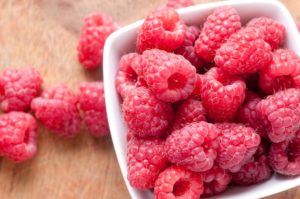 Some high-fibre foods that are good for your gut bacteria include: raspberries, artichokes, green peas, broccoli, chickpeas, lentils, beans (kidney, pinto and white), whole grains.
Some high-fibre foods that are good for your gut bacteria include: raspberries, artichokes, green peas, broccoli, chickpeas, lentils, beans (kidney, pinto and white), whole grains.
Prebiotic Foods: are non-digestible foods or ingredients that promise the growth of beneficial microorganisms in the intestines. In other words, they’re food for our gut bacteria. Good examples of prebiotics include oats, bananas, onions, garlic, leeks, asparagus, and artichokes.
Dandelion: These leaves are a diuretic, so are great for relieving fluid retention. As a prebiotic, they’re useful for supporting the growth of beneficial bacteria in the gut. Often seen as a weed, this is actually a valuable nutrient-dense green packed with folate, vitamin K and magnesium. Add the leaves to green juices, smoothies, soups and salads.
Caprylic Acid: Also known as octanoic acid, is a fatty acid that is naturally found within coconut oil. It is known for its antiviral and antifungal abilities and is especially helpful for people that feel they are suffering from Candida or yeast overgrowth.
Bone Broth: A traditional food used for centuries, bone broth is incredibly rich in minerals, glycine, proline and glutamine. Glutamine is the most important amino acid for healing the gut wall. Exceptionally easy to digest, bone broth provides a nourishing, nutrient-dense delivery system that soothes the gut lining, stimulates digestion and requires very little energy to assimilate. Check out our Ebook…..”What’s all the Hoo Har about Bone Broth” and learn more about the benefits of bone broth and how to make your own or buy the highest quality, ready made bone broth you can.
Glutamine: As we said above glutamine is the most important amino acid for healing the gut wall. It has been shown to reduce intestinal permeability (leaky gut) in people who are critically ill.1 You can increase your glutamine levels by eating foods such as turkey, soybeans, eggs and almonds.
Glutamine can also be taken in supplement form but talk to your healthcare practitioner first to ensure that it’s an appropriate treatment strategy for you.
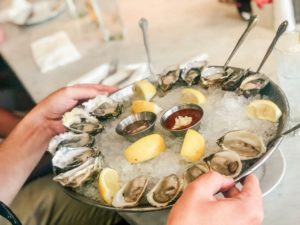 Zinc: is a mineral that has been shown to be critical for a healthy gut, and a deficiency can lead to various gastrointestinal disorders and supplementing with zinc has been shown to be beneficial in treating diarrhea, colitis, leaky gut and other digestive issues.2
Zinc: is a mineral that has been shown to be critical for a healthy gut, and a deficiency can lead to various gastrointestinal disorders and supplementing with zinc has been shown to be beneficial in treating diarrhea, colitis, leaky gut and other digestive issues.2
Foods high in zinc include shellfish, beef and sunflower seeds.The recommended daily intake (RDI) for zinc is 8 mg for women and 11 mg for men.
For Gut Strength
Probiotics: Probiotics are broadly defined as strains of bacteria that support the health of the host in some way. Basically, they’re live bacteria, usually ingested in pill, powder, or liquid form. Probably one of THE most important supplements you can take when trying to boost your gut health as they assist in replenishing the good bacteria and crowding out the bad bacteria.
It’s important to remember that our ancestors got their probiotics from the foods they consumed. They ate off the land and much of the food and liquid they consumed was brimming with mega-doses of environmental bacteria. In this modern age of sterilized food systems, these essential strains have been nearly eliminated and our exposure to them is very limited. This makes supplementing with them a very important part of a healthy lifestyle.
The trick is to introduce them once you’ve increased bacterial diversity and greater health into the gut. The other important note is to make sure the probiotic you use meets your digestive need meaning many probiotics may only make it to the small intestine and not the large intestine. For people with small Intestinal overgrowths and stomach issues -need to make sure they use a probiotic that can resist stomach acids and be dispersed where we need the probiotics the most which by most reports seems to be the large intestine.
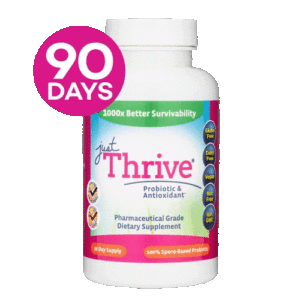 That’s why I’ve using this particular probiotic – Just Thrive® as it replaces the outdated approach of “reseeding” the gut (which would be like throwing seeds in an abandoned garden and hoping they grow), and opts for the more integrative approach of “reconditioning” the gut which removes pathogens and bad bacteria, thereby allowing good bacteria to grow and thrive. The specialised spore-based bacilli formulation of Just Thrive® Probiotic guarantees the survivability of our probiotic strains through the stomach and upper digestive system. It not only provides digestive and immune support as a potent probiotic, but also delivers powerful and necessary antioxidants to the GI tract.
That’s why I’ve using this particular probiotic – Just Thrive® as it replaces the outdated approach of “reseeding” the gut (which would be like throwing seeds in an abandoned garden and hoping they grow), and opts for the more integrative approach of “reconditioning” the gut which removes pathogens and bad bacteria, thereby allowing good bacteria to grow and thrive. The specialised spore-based bacilli formulation of Just Thrive® Probiotic guarantees the survivability of our probiotic strains through the stomach and upper digestive system. It not only provides digestive and immune support as a potent probiotic, but also delivers powerful and necessary antioxidants to the GI tract.
I like that approach. For more information click here.
NATURAL SOURCES OF PROBIOTICS
- Kombucha
- Krass
- Milk kefir (can be made with coconut milk)
- Organic soil
- Raw Lacto-fermented condiments (relishes, salsa)
- Raw Lacto-fermented fruits (green papaya, chutney)
- Raw Lacto-fermented vegetables (carrots, turnips, beets, pickles, kimchi)
- Raw sauerkraut
- Water kefir
- Yogurt (can be made with coconut milk or nut or seed milk)
 Fermented Foods: These foods are naturally packed with probiotics that promote healthy gut bacteria. Along with bone broths, fermented veggies rule the gut-healing food world. These amazing foods are rich with live, active enzymes and probiotics. The tart flavour helps to stimulate digestive acids and it is suggested that there are many immune-supportive and anti-carcinogenic acids in fermented foods to further help with gut health. They key is to start with very small amounts, and slowly increase.
Fermented Foods: These foods are naturally packed with probiotics that promote healthy gut bacteria. Along with bone broths, fermented veggies rule the gut-healing food world. These amazing foods are rich with live, active enzymes and probiotics. The tart flavour helps to stimulate digestive acids and it is suggested that there are many immune-supportive and anti-carcinogenic acids in fermented foods to further help with gut health. They key is to start with very small amounts, and slowly increase.
For breakfast try two eggs with a tablespoon of sauerkraut and half an avocado.
. . . . .
 Yours in Health,
Yours in Health,
Jennifer Barham-Floreani
(Bach. Chiropractic, Bach. App Clinical Science
Registered internationally, no longer practicing as a chiropractor in Australia.)
. . . . .
1 Mottaghi A, Yeganeh MZ, et al.Efficacy of glutamine-enriched enteral feeding formulae in critically ill patients: a systematic review and meta-analysis of randomized controlled trials. Asia Pac J Clin Nutr. 2016;25(3):504-12.2 Skrovanek S1, DiGuilio K1, et al. Zinc and gastrointestinal disease.World J Gastrointest Pathophysiol. 2014 Nov 15;5(4):496-513


